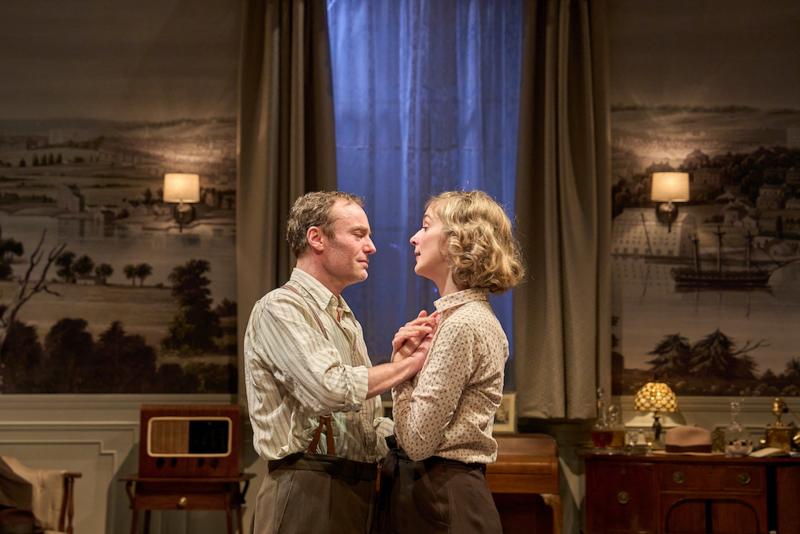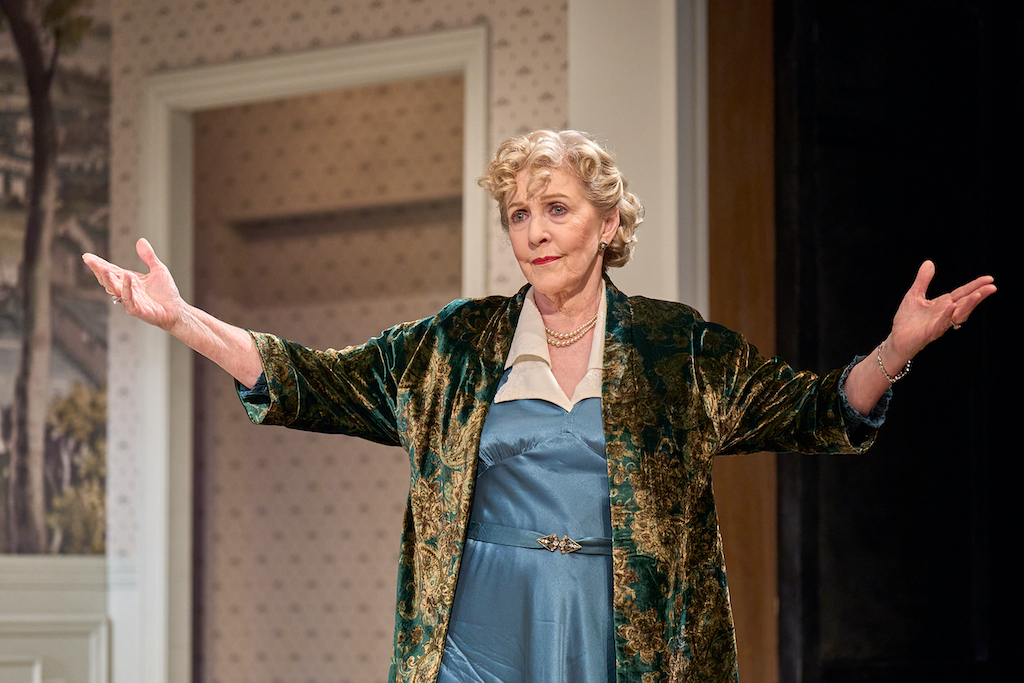Watch on the Rhine, Donmar Warehouse review - Lillian Hellman's 1940 play is still asking awkward questions | reviews, news & interviews
Watch on the Rhine, Donmar Warehouse review - Lillian Hellman's 1940 play is still asking awkward questions
Watch on the Rhine, Donmar Warehouse review - Lillian Hellman's 1940 play is still asking awkward questions
In wartime, when tough actions are needed to back up easy words, what do you do?

We’re reminded, in a grainy black and white video framing device, that, as late as the summer of 1941, the USA saw World War II as just another European war. As brilliantly illustrated in Phillip Roth’s The Plot Against America, not only was such indifference to the rise of fascism more widespread than feels comfortable to reflect upon, but so, too, was a sympathy extended to the Nazis in their psychotic mission to make Germany great again.
It was against that complacent background that Lillian Hellman wrote Watch on the Rhine, a seductive call to arms that knew its audience of New York’s WASPish well-to-do, so took good care not to frighten the horses. But it packed enough punch then and, in another January that sees a major democracy failing to deliver a peaceful transfer of power, it packs plenty in the new Donmar revival, as well.
We open on a DC country house that finds Fanny, the matriarch, bickering with long-suffering servants, fading aristocratic guests falling out in public before breakfast, the useless son, everything in a tizzy at the prospect of the daughter, Sara, returning home after two decades in Europe. It all feels a bit Blandings Castle, or maybe Downton Abbey, but with less wit and less vivid characters. Eventually, the play finds its feet when Hellman finds her fire.
That comes in the form of Sara’s family, her three precocious children who are multilingual, charming and intelligent if shabbily dressed, and her husband Kurt, physically and psychologically wounded but unbowed, and somewhat reluctant to discuss the last seven years – we can all guess why. So emerges the central question of the play: can comfortable circumstances and distance excuse inaction when democracy and humanity are under direct threat elsewhere? Hellman’s play was a call to arms staged a few months before Pearl Harbour rendered such questions otiose.
Ellen McDougall directs a stellar cast who give everything to a play that doesn’t quite deserve it. Carlyss Peer gives her all to the painfully underwritten role of the Countess de Brancovis, while John Light all but twirls his moustache as the villainous Count, a Romanian pegged as a wrong ‘un the moment he turns up. Kate Duchêne delivers a fine cameo as the housekeeper, Anise, and David Webber’s observant butler, Joseph, present purely to roll his eyes at the entitlement of it all, is another of whom we would like to see more. That said, the central plot is fully compelling. Mark Waschke is magnetic as the mysterious, damaged German engineer (who is not an engineer), and Caitlin FitzGerald brings real agency to Sara, a role that could easily slide into the over-familiar trope of the long-suffering wife without her sensitive portrayal of the costs levied on those who fight for the cause in their own way. As much-needed comic relief, Billy Byers, Chloe Raphael and Bertie Caplan make a wonderfully warm trio of kids, but, like the von Trapp children, they also know the price their parents are paying with their principles and bring out that poignancy beautifully.
That said, the central plot is fully compelling. Mark Waschke is magnetic as the mysterious, damaged German engineer (who is not an engineer), and Caitlin FitzGerald brings real agency to Sara, a role that could easily slide into the over-familiar trope of the long-suffering wife without her sensitive portrayal of the costs levied on those who fight for the cause in their own way. As much-needed comic relief, Billy Byers, Chloe Raphael and Bertie Caplan make a wonderfully warm trio of kids, but, like the von Trapp children, they also know the price their parents are paying with their principles and bring out that poignancy beautifully.
It is the mother and son relationship that poses the central question, Geoffrey Streatfeild finding his voice as David, leaving his Bertie Woosterish buffoonery behind as he (and by extension us) realises that, as the phrase has it, shit just got real. So too Patricia Hodge’s Fanny (pictured above), whom we know is more than the walking cliche of Act One, but it is still satisfying to see her tested and coming through, as we all hope we would in such circumstances.
Josh Middleton’s musical choices, drawing on the Weimar songs of Mischa Spoliansky and Friedrich Hollaendar, along with one or two minor textual changes, adds a much-needed Jewish dimension to the play, one that Hellman felt she had to hide on Broadway 80 years ago, where, one presumes, Jews were admitted as entertainers but not agitators. It’ll be a matter of taste, but by giving us a little of this context, I felt this rather half-hearted approach denied a lot. It’s not like we don’t know about Kristallnacht or the death camps, nor about how anti-Semitism has crawled out of the sewer in the USA and UK in recent years. The subtext of the early 1940s can sustain text in the 2020s.
That is a quibble though in a play that, for all its structural flaws, refuses to talk down to its audience, makes some salient points without sugaring its message. The “What did you in the Great War, Daddy?” poster of 1915 has its critics, but I fear our children will ask us that same question some 20 years hence unless those of us who value democracy are prepared to defend it with a bit more than a smile or two at satirical pieces in the New York Times.
rating
Explore topics
Share this article
The future of Arts Journalism
You can stop theartsdesk.com closing!
We urgently need financing to survive. Our fundraising drive has thus far raised £49,000 but we need to reach £100,000 or we will be forced to close. Please contribute here: https://gofund.me/c3f6033d
And if you can forward this information to anyone who might assist, we’d be grateful.

Subscribe to theartsdesk.com
Thank you for continuing to read our work on theartsdesk.com. For unlimited access to every article in its entirety, including our archive of more than 15,000 pieces, we're asking for £5 per month or £40 per year. We feel it's a very good deal, and hope you do too.
To take a subscription now simply click here.
And if you're looking for that extra gift for a friend or family member, why not treat them to a theartsdesk.com gift subscription?
more Theatre
 Wendy & Peter Pan, Barbican Theatre review - mixed bag of panto and comic play, turned up to 11
The RSC adaptation is aimed at children, though all will thrill to its spectacle
Wendy & Peter Pan, Barbican Theatre review - mixed bag of panto and comic play, turned up to 11
The RSC adaptation is aimed at children, though all will thrill to its spectacle
 Hedda, Orange Tree Theatre review - a monument reimagined, perhaps even improved
Scandinavian masterpiece transplanted into a London reeling from the ravages of war
Hedda, Orange Tree Theatre review - a monument reimagined, perhaps even improved
Scandinavian masterpiece transplanted into a London reeling from the ravages of war
 The Assembled Parties, Hampstead review - a rarity, a well-made play delivered straight
Witty but poignant tribute to the strength of family ties as all around disintegrates
The Assembled Parties, Hampstead review - a rarity, a well-made play delivered straight
Witty but poignant tribute to the strength of family ties as all around disintegrates
 Mary Page Marlowe, Old Vic review - a starry portrait of a splintered life
Tracy Letts's Off Broadway play makes a shimmeringly powerful London debut
Mary Page Marlowe, Old Vic review - a starry portrait of a splintered life
Tracy Letts's Off Broadway play makes a shimmeringly powerful London debut
 Little Brother, Soho Theatre review - light, bright but emotionally true
This Verity Bargate Award-winning dramedy is entertaining as well as thought provoking
Little Brother, Soho Theatre review - light, bright but emotionally true
This Verity Bargate Award-winning dramedy is entertaining as well as thought provoking
 The Unbelievers, Royal Court Theatre - grimly compelling, powerfully performed
Nick Payne's new play is amongst his best
The Unbelievers, Royal Court Theatre - grimly compelling, powerfully performed
Nick Payne's new play is amongst his best
 The Maids, Donmar Warehouse review - vibrant cast lost in a spectacular-looking fever dream
Kip Williams revises Genet, with little gained in the update except eye-popping visuals
The Maids, Donmar Warehouse review - vibrant cast lost in a spectacular-looking fever dream
Kip Williams revises Genet, with little gained in the update except eye-popping visuals
 Ragdoll, Jermyn Street Theatre review - compelling and emotionally truthful
Katherine Moar returns with a Patty Hearst-inspired follow up to her debut hit 'Farm Hall'
Ragdoll, Jermyn Street Theatre review - compelling and emotionally truthful
Katherine Moar returns with a Patty Hearst-inspired follow up to her debut hit 'Farm Hall'
 Troilus and Cressida, Globe Theatre review - a 'problem play' with added problems
Raucous and carnivalesque, but also ugly and incomprehensible
Troilus and Cressida, Globe Theatre review - a 'problem play' with added problems
Raucous and carnivalesque, but also ugly and incomprehensible
 Clarkston, Trafalgar Theatre review - two lads on a road to nowhere
Netflix star, Joe Locke, is the selling point of a production that needs one
Clarkston, Trafalgar Theatre review - two lads on a road to nowhere
Netflix star, Joe Locke, is the selling point of a production that needs one
 Ghost Stories, Peacock Theatre review - spirited staging but short on scares
Impressive spectacle saves an ageing show in an unsuitable venue
Ghost Stories, Peacock Theatre review - spirited staging but short on scares
Impressive spectacle saves an ageing show in an unsuitable venue
 Hamlet, National Theatre review - turning tragedy to comedy is no joke
Hiran Abeyeskera’s childlike prince falls flat in a mixed production
Hamlet, National Theatre review - turning tragedy to comedy is no joke
Hiran Abeyeskera’s childlike prince falls flat in a mixed production

Add comment